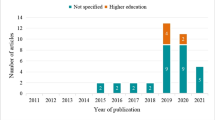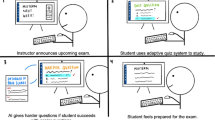Abstract
Nowadays, university teaching can no longer rely solely on the pillar of traditional teaching, research on new teaching/learning methods is becoming more and more numerous, especially with the integration of new information and communication technologies, which play an important role in our daily lives. In the case of our university, all the algorithmic courses taught in the first year of computer science at our university are face-to-face; our research aims to present the improvements that online adaptive training can bring to the learning style of learners. In particular, in terms of learners’ subjective satisfaction and learning speed and performance. The objective of this research is to find the contribution that problem-based learning can make to the learner’s learning style within a social network. The technique proposed in this paper aims to personalize learning by applying Felder–Silverman’s model of learning styles and intelligent technologies, for example, such as ontology and data mining methods to improve the quality and sustainability of learning. The PBL process does not focus on problem solving with a defined solution, but takes into consideration the improvement of other attractive abilities and qualities. This will include learning, improved collaboration and group communication.








Similar content being viewed by others
References
Savery, J. (2015). Overview of problem-based learning: Definitions and distinctions. Interdisciplinary Journal of Problem-Based Learning, 9(1), 9–20.
Xian, H., & Madhavan, K. (2013). Building on and honoring forty years of PBL scholarship from howard barrows: a scientometric, large-scale data, and visualization-based analysis. Interdisciplinary Journal of Problem-Based Learning, 7(1). https://doi.org/10.7771/1541-5015.1325.
Koschmann, T., Kelson, A. C., Feltovich, P. J., Barrows, H. S. (1996). Computer-supported problem-based learning: A principled approach to the use of computers in collaborative learning. CSCL: Theory and practice of an emerging paradigm, 83–124.
Torp, L., & Sage, S. (2002). Problems as possibilities: Problem-based learning for k-16 education (2nd ed.). Alexandria: ASCD.
Lazakidou, G., & Retalis, S. (2010). Using computer supported collaborative learning strategies for helping students acquire self-regulated problem-solving skills in mathematics. Computers & Education, 54(1), 3–13.
Klegeris, A., & Hurren, H. (2011). Impact of problem-based learning in a large classroom setting: Student perception and problem-solving skills. Advances in Physiological Education, 35, 408–415. https://doi.org/10.1152/advan.00046.2011.
Capon, N., & Kuhn, D. (2004). What’s so good about problem-based learning? Cognition and Instruction, 22, 61–79.
Goran, Š. P. (2012). Java problem-based learning. Vojnotehnički Glasnik, 60(1), 57–69.
Chowdhury, R. (2015). Learning and teaching style assessment for improving project-based learning of engineering students: A case of United Arab Emirates University. Australasian Journal of Engineering Education, 20, 1. https://doi.org/10.7158/D13-014.2015.20.1.
Babori, A., Fassi, H. F., Hariri, A., & Bideq, M. (2016). An e-Learning environment for algorithmic: Toward an active construction of skills. World Journal on Educational Technology: Current Issues, 8(2), 82–90.
Pease, M., & Kuhn, D. (2011). Experimental analysis of the effective components of problem-based learning. Science Education, 95, 57–86.
Zimmerman, B. (1989). A social cognitive view of self-regulated academic learning. Journal of Educational Psychology, 81, 329–339.
Teimzit, A., Belhaoues, T., Bensebaa, T. (2011). Ontoalgo: ontologie de domaine dans un EIAH d’algorithmique. In: Conference in information systems and technologies ICIST, Tébessa, Algérie, 2011.
Felder, R. M., & Soloman, B. A. (2001). Index of learning styles questionnaire. Raleigh: North Carolina State University.
Felder, R. M., & Silverman, L. K. (1988). Learning and teaching styles in engineering education. Engineering Education, 78(7), 674–681.
Author information
Authors and Affiliations
Corresponding author
Additional information
Publisher's Note
Springer Nature remains neutral with regard to jurisdictional claims in published maps and institutional affiliations.
Rights and permissions
About this article
Cite this article
Amira, T., Lamia, M. & Hafidi, M. Learning Styles in a Collaborative Algorithmic Problem-Based Learning. Rev Socionetwork Strat 13, 3–17 (2019). https://doi.org/10.1007/s12626-019-00032-6
Received:
Accepted:
Published:
Issue Date:
DOI: https://doi.org/10.1007/s12626-019-00032-6




